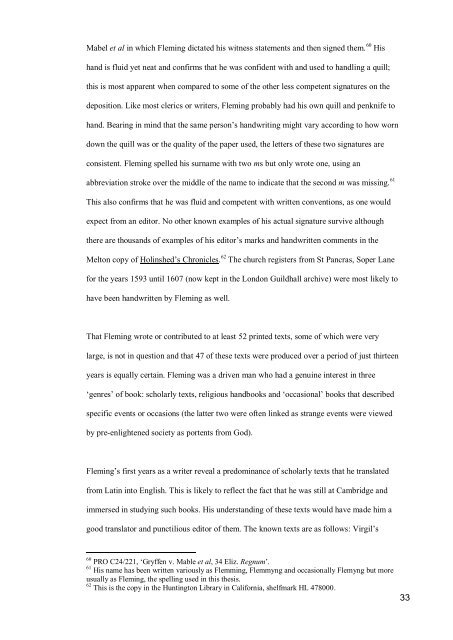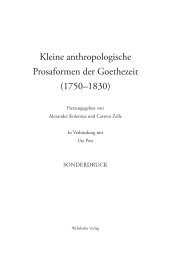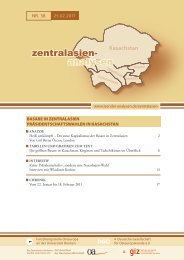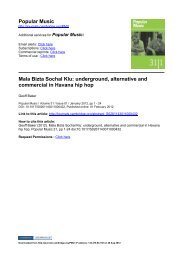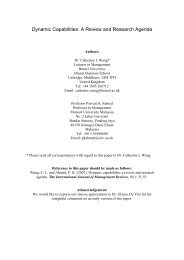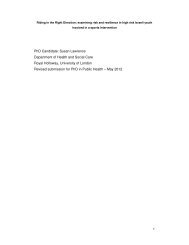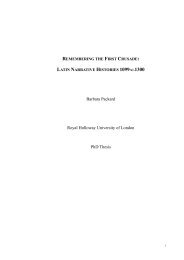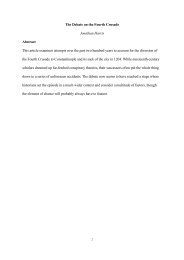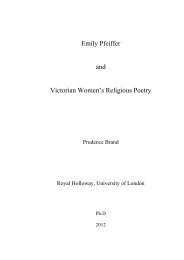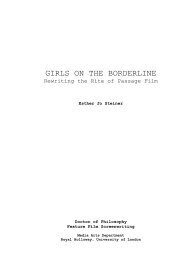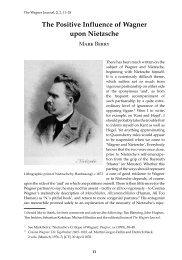- Page 1 and 2: Abraham Fleming: writer, cleric and
- Page 3 and 4: Abstract: Since his death in 1607,
- Page 5 and 6: Acknowledgements There are a number
- Page 7 and 8: Table of Contents 1. Re-introducing
- Page 9 and 10: Chapter One: Re-introducing Abraham
- Page 11 and 12: increasingly cultured population. T
- Page 13 and 14: facsimile of Strange and Terrible W
- Page 15 and 16: her article was focused on Holinshe
- Page 17 and 18: The most recent published study of
- Page 19 and 20: Clegg at least attempted to vary so
- Page 21 and 22: as just that: “fratrem suum uteri
- Page 23 and 24: One of his poems was printed as par
- Page 25 and 26: Once his career as a published writ
- Page 27 and 28: Fleming also owned or at least acce
- Page 29 and 30: she ensured that, in accordance wit
- Page 31 and 32: Identifying Fleming’s contributio
- Page 33: These Latin mottos reveal a lot abo
- Page 37 and 38: Fleming’s titles were produced in
- Page 39 and 40: The Wunder pamphlet actually relate
- Page 41 and 42: added “The copy written to the Pr
- Page 43 and 44: The accounts in Wunder, Holinshed
- Page 45 and 46: to John Hindes for whipping dogges
- Page 47 and 48: eeds were not as good natured. 83 T
- Page 49 and 50: hound in Dogges, which Fleming desc
- Page 51 and 52: Among men it is growen in custome,
- Page 53 and 54: yesterday’s news. Secondly, Flemi
- Page 55 and 56: sedition in 1577, he exiled himself
- Page 57 and 58: other superstitious monuments”. 1
- Page 59 and 60: However, a later entry from the sam
- Page 61 and 62: after Wunder was printed, his caree
- Page 63 and 64: Chapter Three: The Footepath of Fai
- Page 65 and 66: English. During Fleming’s lifetim
- Page 67 and 68: started his own business on Fleet S
- Page 69 and 70: Blower prepared his presses one mor
- Page 71 and 72: Prince Charles with the Spanish Inf
- Page 73 and 74: Loe here a short lesson, whereon if
- Page 75 and 76: egistered with the Stationer’s Co
- Page 77 and 78: these cooperative and hard-working,
- Page 79 and 80: section ‘Handfull of Holy Hymnes
- Page 81 and 82: Fleming recognized that there was a
- Page 83 and 84: Diamond to Sir George and Lady Care
- Page 85 and 86:
The religious messages in Diamond h
- Page 87 and 88:
Wootton next claimed that Fleming w
- Page 89 and 90:
used by Familists. Wootton did not
- Page 91 and 92:
able to understand the different me
- Page 93 and 94:
contention in the past, Fleming’s
- Page 95 and 96:
Fleming and the contributing antiqu
- Page 97 and 98:
Thynne has never been put forward a
- Page 99 and 100:
comers, by the name of Raphael Holi
- Page 101 and 102:
Thynne’s ‘Particular Catalog’
- Page 103 and 104:
antiquaries Stow and Hooker because
- Page 105 and 106:
had twisted his godly pamphlet. Thi
- Page 107 and 108:
The next study was Booth’s A book
- Page 109 and 110:
surviving copies of the ‘Continua
- Page 111 and 112:
Background to the second edition of
- Page 113 and 114:
the impression were not willing to
- Page 115 and 116:
manuscripts and books written by Fl
- Page 117 and 118:
common and they made a good team. T
- Page 119 and 120:
Similarly Peck described “MS. Man
- Page 121 and 122:
furnished me with more large instru
- Page 123 and 124:
Elizabeth had vacillated over the i
- Page 125 and 126:
may seeme at the first blush (I con
- Page 127 and 128:
These seem unsatisfactory arguments
- Page 129 and 130:
Chapter Five: Fleming’s Printed B
- Page 131 and 132:
significant of Fleming’s entire c
- Page 133 and 134:
The sole surviving copy of Fleming
- Page 135 and 136:
Thomas Corser (1793-1876) who had a
- Page 137 and 138:
with his Georgiks”, which suggest
- Page 139 and 140:
Attributing books to Fleming has be
- Page 141 and 142:
ab Academia”) but as he did not l
- Page 143 and 144:
exactly the years when Registre, wi
- Page 145 and 146:
Virgil who leads Dante through the
- Page 147 and 148:
The last text to belong to this gro
- Page 149 and 150:
Conduit) provides evidence of the o
- Page 151 and 152:
Company could provide money and clo
- Page 153 and 154:
Were pliant to supplie the wantes,
- Page 155 and 156:
these dedications suggests that Cor
- Page 157 and 158:
Nausea’s Quolibet alio cometa exp
- Page 159 and 160:
The first edition of Fleming’s Bl
- Page 161 and 162:
that the Stationers’ Company regi
- Page 163 and 164:
writers and printers approached Fle
- Page 165 and 166:
The Martin Frobisher poems Sir Mart
- Page 167 and 168:
soyle”) reveals a great deal abou
- Page 169 and 170:
The Martin Frobisher poems were inc
- Page 171 and 172:
This edition, hereafter Pithie Expo
- Page 173 and 174:
write the letter in Comfortable Exp
- Page 175 and 176:
‘Paraier vnto almightie God’ wa
- Page 177 and 178:
was copied by Ambrosius Autpertus (
- Page 179 and 180:
The earliest existing edition assoc
- Page 181 and 182:
Nescio quis oculus teneros mihi fas
- Page 183 and 184:
Thomas Cooper against the followers
- Page 185 and 186:
(hereafter Certaine Sermons) was pr
- Page 187 and 188:
ook printed by Denham and Middleton
- Page 189 and 190:
as with all his writing, his texts
- Page 191 and 192:
ook. The colophon states that Eicas
- Page 193 and 194:
Miller suggested that Fleming refer
- Page 195 and 196:
Latine toong as by further search t
- Page 197 and 198:
into the book. 344 Despite this Pur
- Page 199 and 200:
tongues, and now in English by Iohn
- Page 201 and 202:
Chapter Seven: Ordination, Paul’s
- Page 203 and 204:
did his involvement in Golding’s
- Page 205 and 206:
shown great interest. He certainly
- Page 207 and 208:
next sermon at Paul’s Cross shoul
- Page 209 and 210:
after his ordination, and as a priv
- Page 211 and 212:
Day. Perhaps this sermon countered
- Page 213 and 214:
Fleming’s. The reference is in th
- Page 215 and 216:
The Howard Family Fleming’s exact
- Page 217 and 218:
he played a role in the funeral of
- Page 219 and 220:
commitments to the Howards took up
- Page 221 and 222:
Abrahami Flemingi ad D. Archiepisco
- Page 223 and 224:
shared a boundary with another tiny
- Page 225 and 226:
paperwork, Fleming preferred to cat
- Page 227 and 228:
Abrahami Flemingi de Vita sua succi
- Page 229 and 230:
Chapter Eight: Conclusion This stud
- Page 231 and 232:
proverbs and mnemonics to make lear
- Page 233 and 234:
Fleming’s peers were also aware o
- Page 235 and 236:
Thomas Newton, had written at the t
- Page 237 and 238:
Appendix A A biographical timeline
- Page 239 and 240:
1581 Samuel Fleming became Rector o
- Page 241 and 242:
January 1603 24 March 1603 c. Novem
- Page 243 and 244:
Panoplie Title: A Panoplie of Epis
- Page 245 and 246:
Flowers of Epigrammes Title: Flowe
- Page 247 and 248:
Author: translated by Abraham Flemi
- Page 249 and 250:
Pages: 129 Sources: AthC Holdings
- Page 251 and 252:
Printer: Thomas East, Bread Street
- Page 253 and 254:
Holdings: BL Mic.A780(7) (copy from
- Page 255 and 256:
Holdings: BL copy mis-shelved; Folg
- Page 257 and 258:
Comments: there are three print var
- Page 259 and 260:
Alphabet Title: The alphabet of pr
- Page 261 and 262:
Appendix C Peck’s list of Fleming
- Page 263 and 264:
XXI. The Hymn which the foresaid Ea
- Page 265 and 266:
[IV - VI Peck’s .] D. Elizabethae
- Page 267 and 268:
ipse praestiteret) Ordinarius tamen
- Page 269 and 270:
Above: Peterborough Cathedral, Camb
- Page 271 and 272:
Above left: the modern blue plaque
- Page 273 and 274:
Above: a contemporary picture of ol
- Page 275 and 276:
Above: the entry in the burial regi
- Page 277 and 278:
Bibliography 1. Primary Sources Bar
- Page 279 and 280:
Fleming, Abraham, Monomachie of Mot
- Page 281 and 282:
Settle, Dionysis, A True Report of
- Page 283 and 284:
Wilson, N. G. (ed. & trans.), Aelia
- Page 285 and 286:
Lucie-Smith, Edward (ed.), The Peng
- Page 287 and 288:
Cyndia Susan Clegg, ‘Raphael Holi
- Page 289:
Ten, Edward, ‘A Strategy of React


